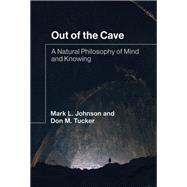
Out of the Cave A Natural Philosophy of Mind and Knowing
by Johnson, Mark L.; Tucker, Don M.-

Free Shipping On All Orders!*
Free economy shipping applies to all orders shipped to residential addresses. Orders shipped to campus receive free standard shipping. Free shipping offers do not apply to Marketplace items.
Buy New
Rent Textbook
Used Textbook
We're Sorry
Sold Out
eTextbook
We're Sorry
Not Available
How Marketplace Works:
- This item is offered by an independent seller and not shipped from our warehouse
- Item details like edition and cover design may differ from our description; see seller's comments before ordering.
- Sellers much confirm and ship within two business days; otherwise, the order will be cancelled and refunded.
- Marketplace purchases cannot be returned to eCampus.com. Contact the seller directly for inquiries; if no response within two days, contact customer service.
- Additional shipping costs apply to Marketplace purchases. Review shipping costs at checkout.
Summary
Plato's Allegory of the Cave trapped us in the illusion that mind is separate from body and from the natural and physical world. Knowledge had to be eternal and absolute. Recent scientific advances, however, show that our bodies shape mind, thought, and language in a deep and pervasive way. In Out of the Cave, Mark Johnson and Don Tucker--a philosopher and a neuropsychologist--propose a radical rethinking of certain traditional views about human cognition and behavior. They argue for a theory of knowing as embodied, embedded, enactive, and emotionally based. Knowing is an ongoing process--shaped by our deepest biological and cultural values.
Johnson and Tucker describe a natural philosophy of mind that is emerging through the convergence of biology, psychology, computer science, and philosophy, and they explain recent research showing that all of our higher-level cognitive activities are rooted in our bodies through processes of perception, motive control of action, and feeling. This developing natural philosophy of mind offers a psychological, philosophical, and neuroscientific account that is at once scientifically valid and subjectively meaningful--allowing us to know both ourselves and the world.
Author Biography
Table of Contents
1 Toward a Natural Philosophy of Mind
2 The Philosophical Quest for Ultimate Knowledge
3 The Intertwining of Self and Knowledge
4 A Pragmatist Naturalistic Framework for Embodied Mind and Knowing
5 The Challenge of a Meaningful Science of Mind: The Quest for an Objective Human Science
6 Embodied Meaning and Thought
7 The Mind's Anatomy
8 How Information is Captured by Neural Networks
9 The Motive Control of Experience
10 What Is a Concept? The Influence of Motive Control on the Formation of Concepts and Personality
11 Abstraction, Self-Awareness, and the Subjective Basis of Knowledge
12 Outline for a Contemporary Natural Philosophy of Mind and Knowing
References
Index
An electronic version of this book is available through VitalSource.
This book is viewable on PC, Mac, iPhone, iPad, iPod Touch, and most smartphones.
By purchasing, you will be able to view this book online, as well as download it, for the chosen number of days.
Digital License
You are licensing a digital product for a set duration. Durations are set forth in the product description, with "Lifetime" typically meaning five (5) years of online access and permanent download to a supported device. All licenses are non-transferable.
More details can be found here.
A downloadable version of this book is available through the eCampus Reader or compatible Adobe readers.
Applications are available on iOS, Android, PC, Mac, and Windows Mobile platforms.
Please view the compatibility matrix prior to purchase.
